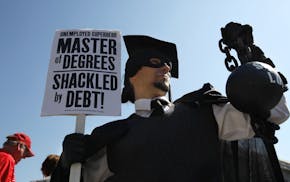Minneapolis city officials thought they were saving downtown in 1995 when they agreed to buy Target Center for $72 million.
Little did they suspect that they were tying a millstone around the necks of two generations of city residents.
Now Minneapolis Mayor R.T. Rybak and other city leaders are scrambling to keep the Vikings on one end of downtown while plugging a cash drain on the other.
Their dilemma is a fresh reminder that paying for these sporting pleasure palaces is rarely a one-time occurrence.
Instead, think of public financing as the gift to team owners that keeps on taking from taxpayers.
It's precisely for this reason that an increasing number of professional sports teams are perfectly content being tenants, rather than owners, of the facilities they play in. They've figured out something that hotel companies did decades ago: With the right lease agreement in hand it's possible to make as much, if not more money, from not owning the real estate.
Real estate is a depreciating asset. The longer you own a building, the more it costs you. The roof needs to be replaced; lighting and energy systems need to be upgraded, etc.
When you're the landlord of a property built principally for one tenant, it's not too difficult to figure out who has the most leverage in that relationship.
Fun fact: The Minnesota Timberwolves built and owned Target Center, but when the franchise ran into financial trouble the team's prospective new owners had no interest in owning the oversized gym. What does that tell you?
So, Minneapolis agreed to buy the arena to keep the Timberwolves from moving. In addition to making the debt payments on the property, the city was contractually bound to spend a certain minimum amount on capital improvements every year.
On Thursday, Council Member Gary Schiff characterized that council vote as "the single worst decision we've ever made."
It's hard to argue with him on that. Minneapolis has invested more than $100 million in Target Center. The building will gobble up an additional $75 million or so in tax increment financing subsidies between now and 2025, but that will still leave the city on the hook for a projected $69 million in operating losses and capital improvements between now and then.
And those totals don't include the $155 million the city estimates it needs to renovate and upgrade what is widely considered one of the most outdated professional sports arena in the country.
No renovation means no Timberwolves come 2025, when the team's lease expires. And that means Minneapolis taxpayers face the prospect of owning a costly and empty white elephant.
"I have no doubt that city leaders thought they were saving downtown and that they never envisioned they were buying a facility that would need endless sources of taxpayer money," Schiff said in an interview Thursday.
I don't blame Rybak for wanting to link paying for the Vikings stadium to paying off Target Center. But that sets off alarm bells in St. Paul, which owns the $170 million home of the Minnesota Wild, the Xcel Energy Center.
Guess what? It needs money, too, for a host of expansion projects. But it still owes the state about $35 million on a construction loan for Xcel, and the additional sales tax that helped finance its construction doesn't provide enough revenue to build a reserve for those projects.
St. Paul and Xcel officials worry that a bailout of Target Center will put Xcel at a competitive disadvantage when it comes to bidding for concerts and other events.
"If Target Center is part of a Vikings package, then we believe the Legislature needs to look at both buildings," said Bill Huepenbecker, senior director of planning and public affairs at St. Paul Arena Co., which manages Xcel. "If there's not something for both, that's problematic for us."
Over the years we've allowed ourselves to be convinced that public ownership of arenas is the hard bargain we've driven with team owners, the price they have to pay in return for public financing.
Turns out it's another way for owners to privatize their gains while socializing losses.
ericw@startribune.com • 612-673-1736

Wieffering: Time to get over debit card fees
For Thrivent and others, warnings were there

With billions in sales, some co-ops are big business
